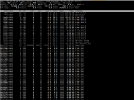Hi,
is it possible to create the ZFS on a local node and use a directory on top of that to store the VM's vs using zvols? When i go to add a directory storage path, it doesn't show the ZFS that I created on the node.
I'm seeing host node loads of 120+ when doing heavy IO on a node with 6xNVME enterprise U2 drives, ZFS Raid 10 using zvols. If I live migrate another VM to this host node, it impacts all the VM's running on the node, 120+ load, zvol chewing up all the CPU etc.
Crazy, I run several dozen TrueNAS filers using ZFS and NFS presented to the host nodes with the same sort of load and I don't break a sweat on the TrueNAS servers. They are not running iscsi/zvol, just zfs with nfs.
It looks like zvols just can't keep up with the IO when running on the local node and it crushes my nodes.
is it possible to create the ZFS on a local node and use a directory on top of that to store the VM's vs using zvols? When i go to add a directory storage path, it doesn't show the ZFS that I created on the node.
I'm seeing host node loads of 120+ when doing heavy IO on a node with 6xNVME enterprise U2 drives, ZFS Raid 10 using zvols. If I live migrate another VM to this host node, it impacts all the VM's running on the node, 120+ load, zvol chewing up all the CPU etc.
Crazy, I run several dozen TrueNAS filers using ZFS and NFS presented to the host nodes with the same sort of load and I don't break a sweat on the TrueNAS servers. They are not running iscsi/zvol, just zfs with nfs.
It looks like zvols just can't keep up with the IO when running on the local node and it crushes my nodes.
Last edited:


